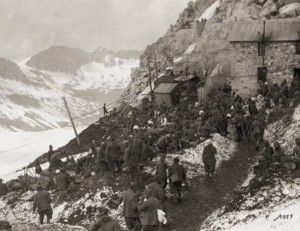Nelborne Front: Difference between revisions
No edit summary |
No edit summary |
||
| (2 intermediate revisions by the same user not shown) | |||
| Line 23: | Line 23: | ||
| combatant1 = '''{{wp|Allies of World War I|Allied powers}}:'''<br>{{flagicon image|Flag of Lormotia.png}} [[Lormotia]]<br>{{flagicon image|New Svealand Flag.png}} [[New Svealand]]<br>{{flagicon image|Flag of the United Kingdom.svg}} {{wp|British Empire}}<br>{{flagicon image|Flag of the United States (1912-1959).svg}} {{wp|United States}} <small>(1917–1919)</small> | | combatant1 = '''{{wp|Allies of World War I|Allied powers}}:'''<br>{{flagicon image|Flag of Lormotia.png}} [[Lormotia]]<br>{{flagicon image|New Svealand Flag.png}} [[New Svealand]]<br>{{flagicon image|Flag of the United Kingdom.svg}} {{wp|British Empire}}<br>{{flagicon image|Flag of the United States (1912-1959).svg}} {{wp|United States}} <small>(1917–1919)</small> | ||
| combatant2 = '''{{wp|Central Powers|Central powers}}:'''<br>{{flagicon image|Flag of the Nelbec Empire.png}} [[Nelbec Empire]] | | combatant2 = '''{{wp|Central Powers|Central powers}}:'''<br>{{flagicon image|Flag of the Nelbec Empire.png}} [[Nelbec Empire]] | ||
| combatant3 = '''Regionalists:'''<br>{{flagicon image|Flag of Seketan.svg}} [[Military-Civilian Council]] <small>(1914–1918)</small><br>{{flagicon image|Flag of Seketan historical 1.png}} [[Kjedorate Republic]] <small>(1918–1919)</small><br>{{flagicon image|Flag of | | combatant3 = '''Regionalists:'''<br>{{flagicon image|Flag of Seketan.svg}} [[Military-Civilian Council]] <small>(1914–1918)</small><br>{{flagicon image|Flag of Seketan historical 1.png}} [[Kjedorate Republic]] <small>(1918–1919)</small><br>{{flagicon image|Flag of Alquiya 2-3.png}} [[Civil Council]] <small>(1917–1919)</small><br>{{flagicon image|Flag of the Sosymet Republic.png}} [[Sosymet states]] <small>(1918–1919)</small><br>{{flagicon image|Flag of Wilskland.png}} [[Wilsk Republic]] <small>(1918-1919)</small><br>{{flagicon image|Flag of Trjebia south.png}} [[Republic of Upper Trjebia|Upper Trjebia]] <small>(1918–1919)</small><br>{{flagicon image|Flag of Trjebia south.png}} [[Republic of Lower Trjebia|Lower Trjebia]] <small>(1918–1919)</small> | ||
| commander1 = | | commander1 = | ||
| commander2 = | | commander2 = | ||
| Line 41: | Line 41: | ||
[[File:Italian alpine troops.jpg|thumb|right|Lormot mountain infantry climbing to defence positions, 1917]] | [[File:Italian alpine troops.jpg|thumb|right|Lormot mountain infantry climbing to defence positions, 1917]] | ||
The '''Nelborne Front''' was a {{wp|theatre of war}} during the {{wp|First World War}}. It began when the [[Nelbec Empire]] [[Lormotia campaign|attacked Lormotia]] and [[invasion of New Svealand (1914)|invaded New Svealand]] in August 1914. Allied to the {{wp|German Empire}}, the Nelbec Empire was at war with the {{wp|Allies of World War I|Allied powers}} and sought to strengthen the {{wp|Central Powers|Central powers'}} position against the {{wp|British Empire}}. By winter, Nelbec advances had largely stalled as both sides dug in and established elaborate trench networks, whose position would change little until 1918. | The '''Nelborne Front''' was a {{wp|theatre of war}} during the {{wp|First World War}}. It began when the [[Nelbec Empire]] [[Lormotia campaign|attacked Lormotia]] and [[invasion of New Svealand (1914)|invaded New Svealand]] in August 1914. Allied to the {{wp|German Empire}}, the Nelbec Empire was at war with the {{wp|Allies of World War I|Allied powers}} and sought to strengthen the {{wp|Central Powers|Central powers'}} position in [[the Nelborne]] against the {{wp|British Empire}}. By winter, Nelbec advances had largely stalled as both sides dug in and established elaborate trench networks, whose position would change little until 1918. | ||
Between 1915 to 1917 the Nelbec Empire launched several additional. offensives. Lormot defences within the [[Yerjtan|Yerjtan mountains]] bottlenecked Nelbec advances who were unprepared for {{wp|mountain warfare}}, resulting in unprecedented casualties. Svealandic defences suffered under initial [[invasion of New Svealand (1914)|Nelbec attacks]] but [[New Svealand campaign|held the line]] with {{wp|Allies of World War I|Allied support}}, with the 1916 [[Battle of Langadalr]] being a major turning point. | |||
By 1917, the [[Civil Council]] and [[Military-Civilian Council]], in [[Kingdom of Alquiya|Alquiya]] and [[Kingdom of Seketan|Seketan]] respectively, advocated for the end of the offensives. A successful [[1918 Svealandic counteroffensive|Svealandic counteroffensive]] broke the morale of the [[Imperial Nelbec Army]], accelerating a series of losses that would eventually lead to the defeat and eventual [[collapse of the Nelbec Empire]]. In Seketan, a [[Seketese Civil War|civil war]] broke out between the [[Kjedorate Republic|recognized Republic of Seketan]] against [[Sosymets|Sosymet and left-wing militants]]. In Alquiya, the Civil Council established the [[Republic of the South Nelbecs and Trjebs]] in accordance to the Nelbec Empire's surrender in the [[Treaty of Glasgow (1919)|Treaty of Glasgow]]. | |||
==Background== | |||
The [[Nelbec peoples]] have inhabited [[the Nelborne]] for millennia and, by the 19th century, had formed three principal [[Nelbec countries|Nelbec states]]: [[Kingdom of Alquiya|Alquiya]], [[Lormotia]] and [[Kindom of Seketan|Seketan]]. | |||
{{Nelborne topics}} | {{Nelborne topics}} | ||
Latest revision as of 23:34, 27 October 2023
| Nelborne Front | ||||||||
|---|---|---|---|---|---|---|---|---|
| Part of World War I | ||||||||
 Defence forces in Lormotia, 1915 | ||||||||
| ||||||||
| Belligerents | ||||||||
|
Allied powers: |
Central powers: |
Regionalists: | ||||||
The Nelborne Front was a theatre of war during the First World War. It began when the Nelbec Empire attacked Lormotia and invaded New Svealand in August 1914. Allied to the German Empire, the Nelbec Empire was at war with the Allied powers and sought to strengthen the Central powers' position in the Nelborne against the British Empire. By winter, Nelbec advances had largely stalled as both sides dug in and established elaborate trench networks, whose position would change little until 1918.
Between 1915 to 1917 the Nelbec Empire launched several additional. offensives. Lormot defences within the Yerjtan mountains bottlenecked Nelbec advances who were unprepared for mountain warfare, resulting in unprecedented casualties. Svealandic defences suffered under initial Nelbec attacks but held the line with Allied support, with the 1916 Battle of Langadalr being a major turning point.
By 1917, the Civil Council and Military-Civilian Council, in Alquiya and Seketan respectively, advocated for the end of the offensives. A successful Svealandic counteroffensive broke the morale of the Imperial Nelbec Army, accelerating a series of losses that would eventually lead to the defeat and eventual collapse of the Nelbec Empire. In Seketan, a civil war broke out between the recognized Republic of Seketan against Sosymet and left-wing militants. In Alquiya, the Civil Council established the Republic of the South Nelbecs and Trjebs in accordance to the Nelbec Empire's surrender in the Treaty of Glasgow.
Background
The Nelbec peoples have inhabited the Nelborne for millennia and, by the 19th century, had formed three principal Nelbec states: Alquiya, Lormotia and Seketan.
